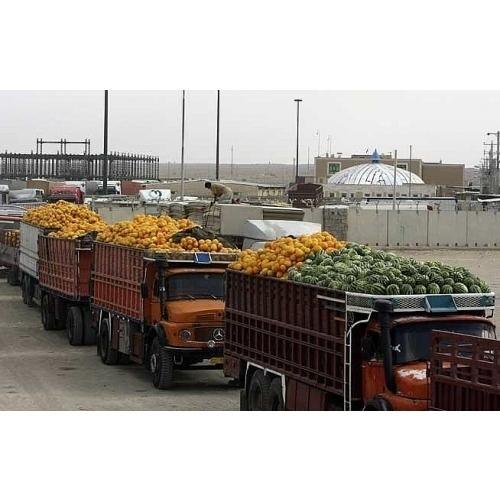India’s ‘Krishi Udan Scheme’ to transport agri produce via air
About 60% of India’s nearly 1.3 billion people live on less than $3.10 a day, the World Bank’s median poverty line. And close to 190 million Indians are still undernourished despite adequate food production. Against this backdraft, the country also struggles to save nearly 40% of agricultural products it produces every year blamed on broken food systems and inefficient supply chains.
Nearly 40% of the food produced in India is wasted every year due to fragmented food systems and inefficient supply chains, according to the Food and Agricultural Organization which pointed out that the loss occurs even before the food reaches consumers.
According to estimates, 16% of fruits and vegetables with short shelf life are wasted due to insufficient cold storage facilities. A report of the United Nations mentions that nearly 190 million Indians remain undernourished despite adequate food production.
 The gravity of this situation is now being understood by the government and some steps have been initiated, albeit getting implemented gradually. The need to step up is what is required. One of the initiatives the government has rolled out is ‘Krishi Udan’ (Krishi is agriculture and Udan is flight).
The gravity of this situation is now being understood by the government and some steps have been initiated, albeit getting implemented gradually. The need to step up is what is required. One of the initiatives the government has rolled out is ‘Krishi Udan’ (Krishi is agriculture and Udan is flight).
Focus on hilly areas, North Eastern States
The Krishi Udan Scheme was launched in August 2020 on international and national routes to assist farmers in transporting agricultural products so that it improves their value realization. Krishi Udan 2.0 was announced in October 2021 enhancing the existing provisions, mainly focusing on transporting perishable food products from the hilly areas, North-Eastern States and tribal areas.
Primarily the scheme was focusing on 25 airports of North-Eastern Region, Hilly and Tribal region namely Agartala, Agatti, Barapani, Dehradun, Dibrugarh, Dimapur, Gaggal, Imphal, Jammu, Jorhat, Kullu (Bhuntar), Leh, Lengpui, Lilabari, Pakyong, Pantnagar, Pithoragarh, Port Blair, Raipur, Ranchi, Rupsi, Shimla, Silchar, Srinagar and Tezu. Subsequently, other 28 AAI airports, namely, Adampur (Jalandhar), Agra, Amritsar, Bagdogra, Bareilly, Bhuj, Chandigarh, Coimbatore, Goa, Gorakhpur, Hindon, Indore, Jaisalmer, Jamnagar, Jodhpur, Kanpur (Chakeri), Kolkata, Nasik, Pathankot, Patna, Prayagraj, Pune, Rajkot, Tezpur, Trichy, Trivandrum, Varanasi and Visakhapatnam have been included in the Scheme.
Krishi Udan is a convergence scheme where eight Ministries /Departments namely Ministry of Civil Aviation, Department of Agriculture & Farmers’ Welfare, Department of Animal Husbandry and Dairying, Department of Fisheries, Ministry of Food Processing Industries, Department of Commerce, Ministry of Tribal Affairs, Ministry of Development of North Eastern Region (DoNER) would leverage their existing schemes to strengthen the logistics for transportation of agri-produce. There is no budgetary allocation for the scheme.
Full waiver of landing, parking, terminal navigational landing charges
Under the scheme, facilitating and incentivizing movement of agri-produce by air transportation by full waiver of Landing, Parking, Terminal Navigational Landing Charges (TNLC), and Route Navigation Facility Charges (RNFC) for Indian freighters and Passenger to Cargo (P2C) at selected airports of the Airports Authority of India, have been included.
A total of 1,08,479 Metric Ton perishable cargo (International + Domestic) was handled in Financial Year 2021-22 (till 28 Feb., 2022) in comparison to 84, 042 Metric Ton handled in Financial Year 2020-21 at AAI airports.
Krishi UDAN 2.0 primarily focuses on transporting perishable food products from the hilly areas, northeastern states and tribal areas. The scheme aims to ensure seamless, cost-effective, time-bound air transportation and associated logistics for all agri-produce.
Multi-modal transportation for better convergence
The objectives are to increase the share of air in the modal mix for transportation of agri-produce, which includes horticulture, fishery, livestock & processed products. To achieve better convergence on various components catering to the development of sustainable and resilient agri-produce value chains across various schemes of the Central and State Governments and their associated agencies as well as the resources committed by the private sector to improve supply chain competitiveness by:
- Providing more air connectivity (national and international) between origin-destination airports aimed at bringing in improved logistics efficiency.
- Improving infrastructure and performance in processing of air cargo by all stakeholders, including agri-produce, horticulture, fisheries, livestock products at airports and off-airport facilities, by regulatory participating governmental agencies (PGAs) is the agenda.
- Imparting special focus to air freight of organic and natural produce of NER, tribal and hilly districts is one of its objectives.
- Achieving better and timely mapping of agri-produce production/ supply centres with domestic demand clusters and international markets in sync with the marketing strategies is its goal.
- Promoting adoption of plant and animal quarantine and other regulatory requirements (at airport) in the export supply chains end-to-end.
- Enabling paperless and contactless interface with all stakeholders through digitization and digitalization via integration with existing e-platforms and their creation as required.
The Union government is committed to doubling farmers income and for doing this, there needs to be a paradigm shift. Doubling farmers income doesn’t mean only increasing the value in the market for the produce but it also means creating a paradigm shift for the farmers.
 Airports Covered under Krishi Udaan 2.0 Scheme
Airports Covered under Krishi Udaan 2.0 Scheme
The Ministry of Civil Aviation is setting up terminals in Leh, Srinagar, Nagpur, Nashik, Ranchi Bagdogra, Raipur and Guwahati. It has selected 53 airports to be covered under the Krishi Udan 2.0 Scheme which will be majorly operated by the Airports Authority of India. Along with these eight domestic and international trade routes will also be started and the routes include Amritsar-Dubai to transport baby corn, Darbhanga and the rest of India to transport Lychees and Sikkim and the rest of India for organic produce.
Trade Route Setup under Krishi Udan 2.0 Scheme
The Central government is also working towards setting up a trade route between Chennai, Vizag and Kolkata and East Asian countries to transport seafood. Other routes include Agartala-Delhi-Dubai for pineapple; Dibrugarh-Delhi-Dubai for Mandarin Oranges and Guwahati to Hong Kong for pulses, fruits and vegetables.
The Ministry has asked states to reduce sales tax on aviation turbine fuel (ATF) to 1 percent for airlines under Krishi Udan 2.0 Scheme. The ministry along with AAI has setup up a hub and spoke model at Agartala, Srinagar, Dibrugarh, Dimapur, Hubbali, Imphal, Jorhat, Lilabari, Lucknow, Silchar, Tezpur, Tirupati and Tuticorin.
In 2022-23, the Ministry will develop a hub and spoke models to transport perishable products in Ahmedabad, Bhavnagar, Jharsuguda, Kozhikode, Mysuru, Puducherry, Rajkot, and Vijayawada. In 2023-24, Agra, Darbhanga, Gaya, Gwalior, Pakyong, Pantnagar, Shillong, Shimla, Udaipur and Vadodara and in 2024-25, Holangi and Salem will be covered.
E-Kushal launched
The ministry will also develop an online portal E-Kushal to facilitate information on Krishi UDAN 2.0, which has its main objective of giving farmers wings by improving the value of realization of agri-produce. Under the scheme, which is path breaking, subsidized fairs would be provided to farmers and delivery of agri-produce, subsidy applicable on national and international routes.
Jyotiraditya M. Scindia, Union Minister of Civil Aviation, said: “Krishi UDAN 2.0 is an example of this government’s collaborative approach towards policy making. This scheme will open up new avenues of growth for the agriculture sector and help attain the goal of doubling farmers’ income by removing barriers in supply chain, logistics and transportation of farm produce.”
The Union Minister said, “We want to take the Anndata to the highest level, by adopting the model of A2A – Agriculture to Aviation. The convergence between the two sectors is possible because of 3 primary reasons – Evolutionary possible use of biofuel for aircraft in future, use of drones in agriculture sector, and due to greater integration and value realisation of agricultural products through schemes like Krishi UDAN.”
This laudable scheme is picking up and the NDA government over the last few years has made farm produce storage a big focus area. A Rs 6,000-crore kickstart project called Sampada a national scheme to develop an integrated supply cold chain for agricultural products is being implemented involving public and private players.
The Food Corporation of India (FCI), which runs the store houses that form the backbone of India’s extremely critical food security program, said efforts are on to bring down further the amount of food grain wasted each year in FCI storages. FCI had commissioned a study by the Indian Council of Agricultural Research (ICAR) to suggest scientific methods to improve storage facilities to reduce wastage.










